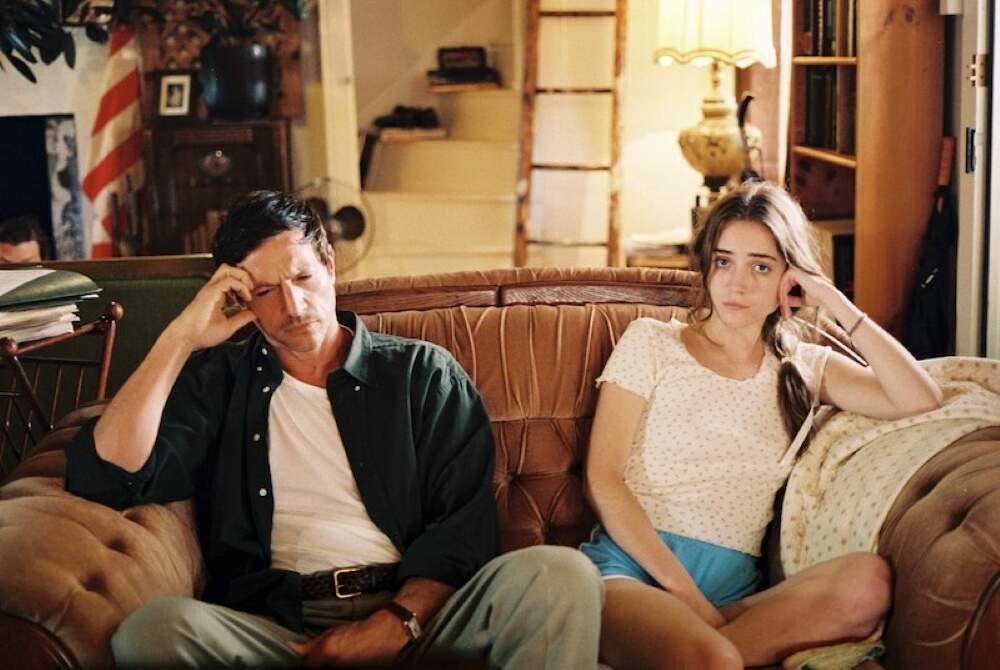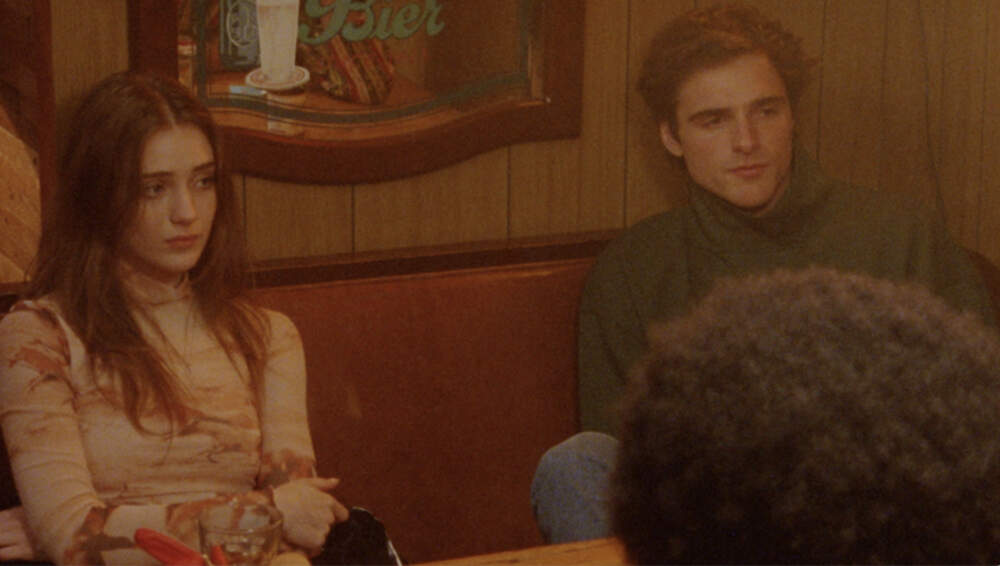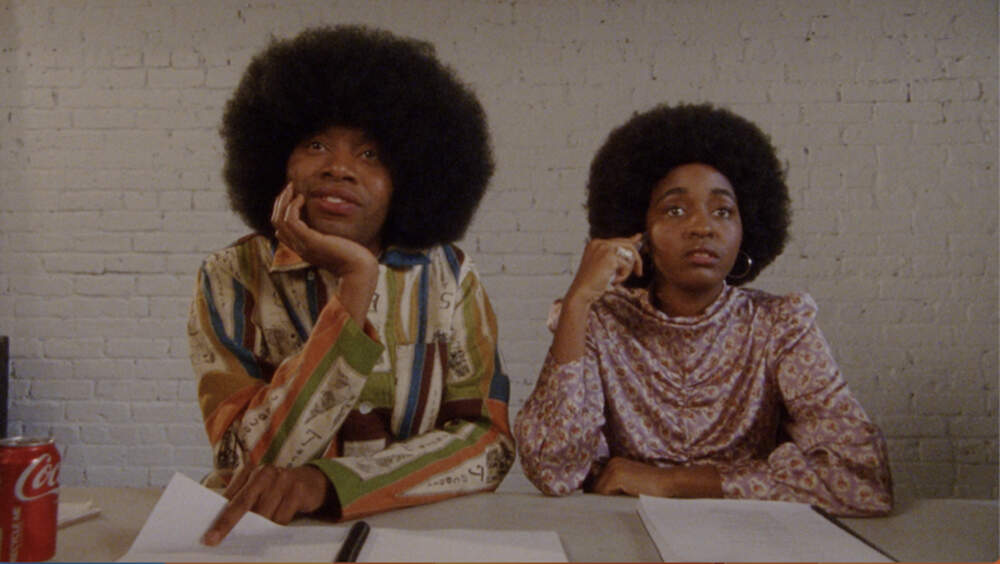Advertisement
Review
'The Sweet East' is a road trip comedy through a lost America

A sneering, scathingly funny state of the union, cinematographer Sean Price Williams’ directorial debut “The Sweet East” takes a picaresque road trip through a country that has lost its common cause. And a lot of its common sense. At once a throwback and a movie very much of the present moment, it’s in the venerable cinematic tradition of “Easy Rider” or “Pee-Wee’s Big Adventure,” refreshed with the spambots and Nazi garbage currently clogging your social media feeds. This bracing, nervy comedy about our collapsing societal infrastructure follows a little girl lost in a post-MAGA America that’s a carnival of subcultures all siloed off from one another. It’s a place where everybody’s talking, but only to themselves.
“Never Rarely Sometimes Always” sidekick Talia Ryder takes the lead here as Lillian, a terminally disaffected high school senior from South Carolina who wanders off during a field trip to our nation’s capital. Peering through a perpetual vape cloud with her eyes rolled, she calls everything “retarded” and is recovering from an underwhelming loss of her virginity to one of her more effusively hick-ish classmates. (When he reminds Lillian it was her idea that they sleep together, she says, “I know. That’s the worst part.”) The students are forced to flee when their dinner is interrupted by a machine gun-toting conspiracy nut — played by comedian Andy Milonakis — who insists there’s a child sex slavery ring being run out of the D.C. pizza parlor’s basement, despite being informed that the building doesn’t have a basement. (Any resemblance to actual events is obviously, entirely intentional.)
Lillian ends up escaping — through the basement, no less — with the help of a crust punk, penis-pierced, self-described “art-ivist” (Earl Cave) who looks around the cellar floor strewn with toys and notes that the place looked a lot bigger when he was a kid. That’s the kind of joke that seems to really tick some people off, and is emblematic of film critic Nick Pinkerton’s screenplay, which takes an impish pride in prodding sacred cows for yuks. Lillian’s “Alice in Wonderland'' misadventures send her down multiple satirical rabbit holes, each diagnosing a different strain of contemporary craziness. Our heroine finds herself falling in with clueless, trust fund antifa kids, sleeping under swastika blankets at the home of a nebbishy white supremacist and finally locked in a barn at an Islamic terrorist training camp, where recruits indulge their inner “Beau Travail” by dancing to Culture Beat’s “Mr. Vain.”

Somewhere in the midst of all this, Lillian is plucked off the sidewalk by a couple of yammering indie filmmakers — energetically portrayed by “Slave Play” writer Jeremy O. Harris and Dorchester’s favorite daughter of the Emerald Isle, Ayo Edebiri — to star in a revisionist historical drama about the building of the Erie Canal. (The resplendently afroed Harris and Edebiri are playing the kind of people who call themselves “creatives” and can talk excitedly for hours on end without saying anything at all.) Our heroine becomes a tabloid sensation after being spotted by the paparazzi with her co-star, an up-and-coming Hollywood heartthrob played in a game bit of meta-casting by Jacob Elordi. Oh, and did I forget to mention that Lillian also stole a duffel bag full of cash that belonged to a neck-tattooed neo-Nazi gang? Oops.
Captivatingly played by Ryder, Lillian is an alluring, vaguely disdainful tabula rasa upon whom the men in the movie — as well as Edebiri’s character, in the interest of equity — can’t help projecting their anxieties and inflicting their enthusiasms. “The Sweet East” updates Terry Southern and Mason Hoffenberg’s scandalous 1958 novel “Candy” for the incel age. Instead of everyone wanting to have sex with the pretty young girl, now they just want to mansplain stuff to her. It’s worth noting that “Candy” was itself a riff on “Candide,” and here we have the unintended consequences of Voltaire’s famous advice, with everybody tending exclusively to their own peculiar gardens.
The most eloquent among them is a white supremacist academic in whose guest room Lillian crashes for a few weeks. Astonishingly well-played by former MTV VJ Simon Rex, he spins endless, specious historical lectures to justify his appalling beliefs while being quietly driven mad by his underage houseguest’s blasé indifference. (Early aughts novelty act Rex reemerged out of nowhere a few years ago to give a spectacular performance in Sean Baker’s “Red Rocket.” The artist formerly known as Dirt Nasty becoming one of the most interesting actors of his generation was not on my bingo card.) “Do you retain any of the information that I share with you?” he angrily asks, his voice unsteady with a lust he dares not acknowledge, especially not to himself.

There’s something inherently hilarious about the film’s various manifestos and ideological harangues being recited to a bored teenage girl who couldn’t possibly care less. Lillian assumes different aliases and identities depending on the situation. She’s mostly just parroting things she’s recently overheard, the best being when she offhandedly claims to be a student at Howard University. Lillian doesn’t have to give up much — or really anything — about herself before the people around her start spilling their guts. The movie envisions a nation of narcissists who can’t wait for their turn to talk.
Fans of Pinkerton’s criticism will recognize his densely verbose, pugilistic writing style. (Not for nothing was his column in the late, lamented Film Comment magazine called “Bombast.”) The grainy, closeup cinematography of Sean Price Williams created the look for some of this past decade’s most exciting independent films, integral to the styles of directors like the Safdie brothers and Alex Ross Perry. Shot in 16mm by Williams and Peter Buntaine, “The Sweet East” exhibits his trademark, rough-hewn visuals with errant lens flares and crummy locales giving way to unexpected bursts of beauty. I daresay the Delaware River has never had such a showcase.
Since premiering at last year’s Cannes Film Festival, “The Sweet East” has amassed a fair amount of finger-wagging from critics who subscribe to the depressingly trendy belief that the politics of art should be prescriptive, a school of thought that drives this reviewer up the wall. To be fair, this is a snide picture with an attitude that’s not for everybody. (The Brattle has been amusingly careful to advertise it as “an equal opportunity offender.”) It’s raggedy and uneven, but also engaged with the grim realities of contemporary life in ways we seldom see at the cinema anymore, especially not in arthouses. Having just sat through a slew of saccharine Sundance titles that amounted to little more than well-meaning affirmations and group hugs, I was re-energized by the rudeness and impropriety of “The Sweet East.” It feels sincere.
More than once, Williams’ film brought to mind Pauline Kael's review of the punk rock classic “Repo Man,” in which she wrote: “A movie like this, with nothing positive in it, can make you feel good.” The broken and laughably needy America as depicted in “The Sweet East” isn’t pretty but it comes from someplace real. The last shot in the picture is of Old Glory and a smirk because, really, what else can you do? I suppose some will tut-tut the nihilism, but I’m not sure you’ll find a more fitting film for an election year in which it seems like most folks would prefer to vote for none of the above.
“The Sweet East” runs at the Brattle Theatre from Friday, Feb. 16 through Monday, Feb. 19.
